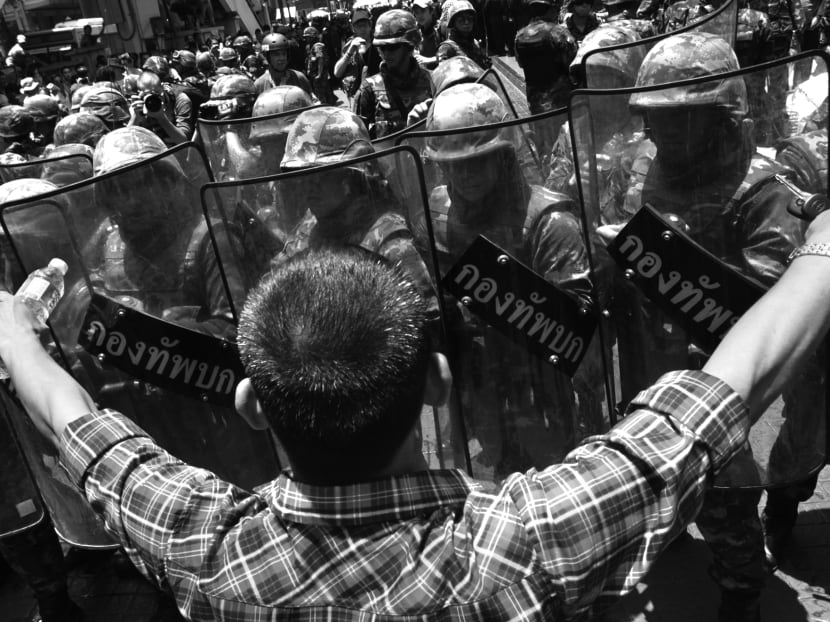Why this Thai coup matters more
Thaksin Shinawatra is living proof that leaders get the popularity thing all wrong. From United States President Barack Obama to Indonesian President Susilo Bambang Yudhoyono, they try governing well, articulating a vision and inspiring — and their approval ratings plummet.

Nearly eight years after being ousted as PM, Thaksin Shinawatra could not be more popular among his Red Shirt supporters from the country’s poorer north-east. PHOTO: AP
Thaksin Shinawatra is living proof that leaders get the popularity thing all wrong. From United States President Barack Obama to Indonesian President Susilo Bambang Yudhoyono, they try governing well, articulating a vision and inspiring — and their approval ratings plummet.
Thailand’s Thaksin tried a different approach. From 2001 to 2006, the tycoon broke laws, lined his pockets, neutered courts and was even accused of crimes against humanity in a war against drugs, then fled overseas in 2008 to avoid prison. However, nearly eight years after being ousted as Prime Minister, he could not be more popular among his Red Shirt supporters from the country’s poorer north-east. And that is what makes this latest Thai coup arguably more dangerous than the 11 earlier military takeovers in the past eight decades.
Never mind that no one outside the army chiefs who grabbed power on Thursday can explain why a coup was even necessary. In 2008, the Red Shirts who rallied around Thaksin were a ragtag bunch. Today, they are organised, politically aware, better financed and raring for a fight. They have spent recent years building political networks and mobilising supporters — efforts that put a Thaksin avatar in the Prime Minister’s office in 2011, his sister Yingluck Shinawatra (she was ousted on May 7 by the courts and has since been detained by the coup leaders).
Even though several Red Shirt leaders have been rounded up and arrested, their political machine is already churning into action. As Dr Thitinan Pongsudhirak of Bangkok’s Chulalongkorn University said: “The opposition and resistance to the coup will likely be strong. This time, the looming confrontation and clashes are going to be severe and violent.”
THAKSIN’S SMOKESCREEN
Why does Thaksin still inspire such loyalty after all this time? My take is that rural Thais have a surreally-romanticised view of his populist Thaksinomics programme. He effectively bribed communities around the nation with waves of public largesse — cash, subsidies, moratoriums on debt payments and other goodies. Who does not love a leader who comes to town tossing treats around?
But the money provided only a sugar high and did little to create balanced and sustainable growth — which is what Thaksin’s followers really need. The handouts were a giant smokescreen to distract supporters, while Thaksin weakened governing institutions in Bangkok to enrich himself and his cronies.
To me, the best explanation of what the former Premier was up to is found in What’s The Matter With Kansas?, which historian Thomas Frank published in 2004 at the height of the Thaksin era. The book explores how conservative leaders in the US and elsewhere trick lower-middle-class citizens to vote against their economic interests. Sure, Thaksin’s cash handouts seemed like a godsend. But by making Thailand his own, he singlehandedly wrecked the nation’s democracy, competitiveness and global reputation.
If Thailand had an effective political opposition, one would think they would be able to expose the hollowness of Thaksin’s programmes in an election. Instead, by intervening yet again, the Thai military is perceived to be doing the bidding of the Bangkok elite, the royalist Yellow Shirts. Rather than puncturing Thaksin’s aura, the generals have simply burnished it further. If they now throw his sister into jail, she will become yet another martyr for the Red Shirts.
With no exit strategy visible for the generals, this coup could easily prove to be an unmitigated disaster, even a prelude to full-blown civil war. The odds of a credible election that heals Thailand’s wounds over the next few years are in the single digits right now.
However, there is no other means of establishing a stable government that both the international community and the Red Shirts will accept.
The 0.6 per cent drop in gross domestic product in the three months through March is only the beginning of the economic fallout to come.
Asian markets are largely ignoring last week’s events in Bangkok, figuring we have seen this before. They are being complacent.
Thursday’s coup demonstrates a debilitating level of political dysfunction that is gradually pulling Thailand in the direction of Egypt and Tunisia, not South Korea. Rather than end Thailand’s political nightmare, this coup could drive the country towards whole new levels of chaos. BLOOMBERG
ABOUT THE AUTHOR:
William Pesek is a Bloomberg View columnist based in Tokyo who writes on economics, markets and politics throughout the Asia-Pacific region.






